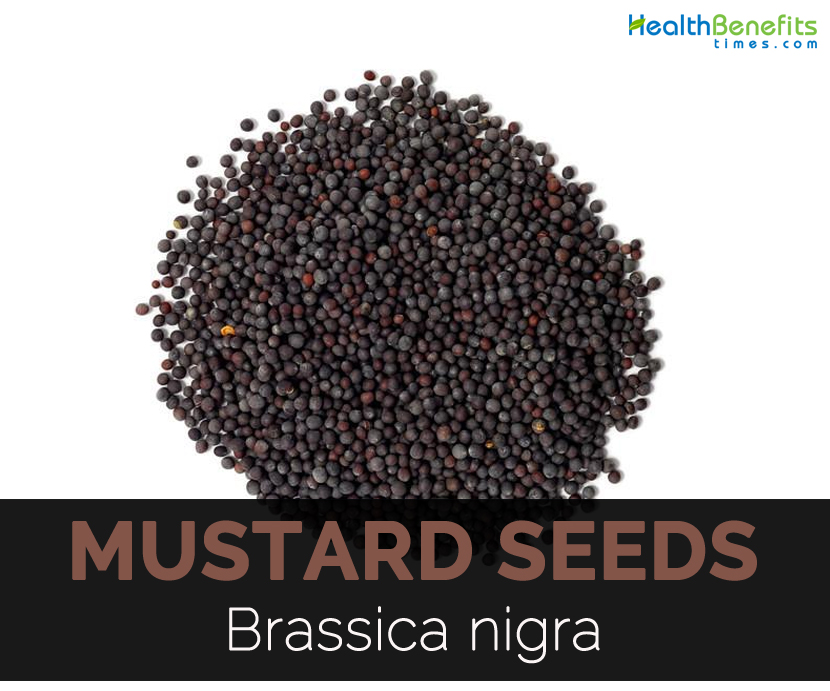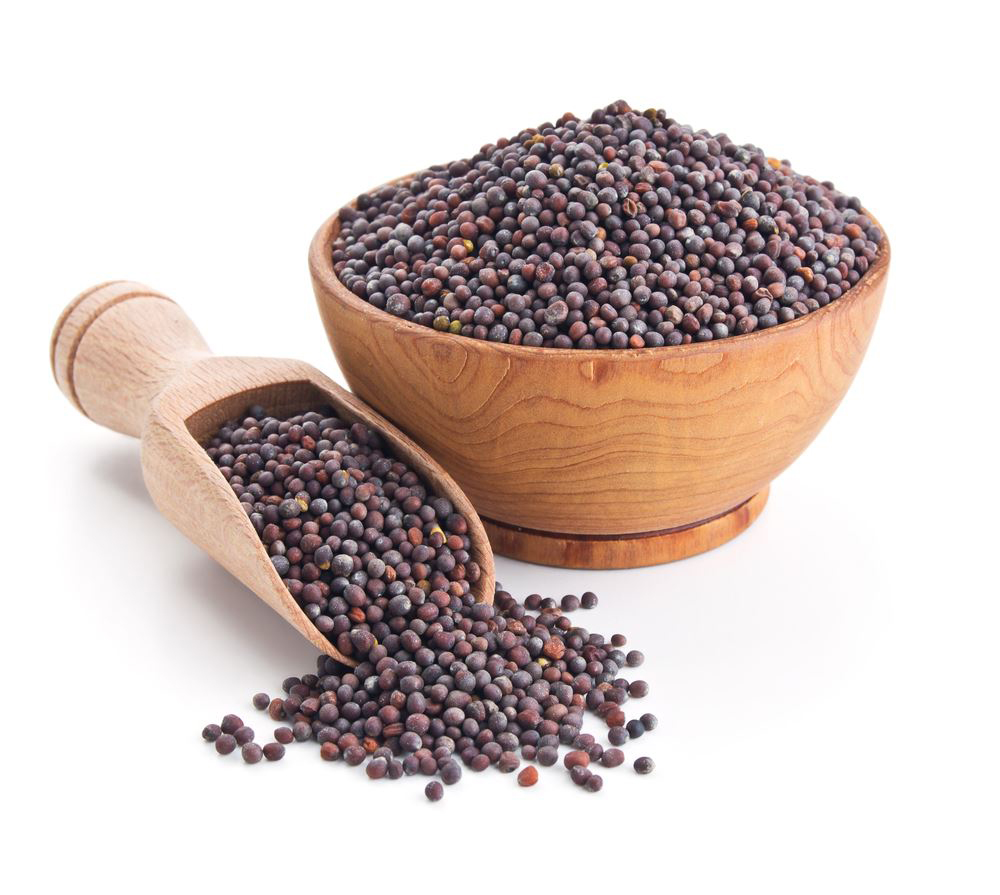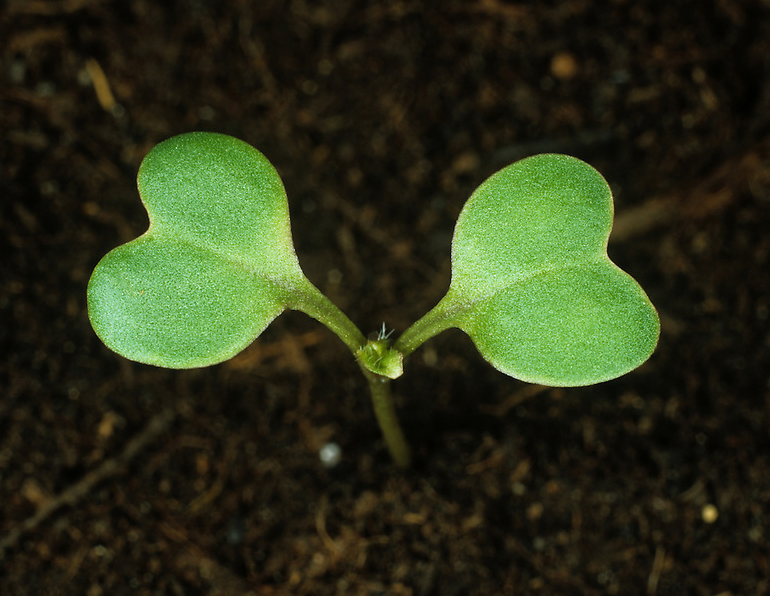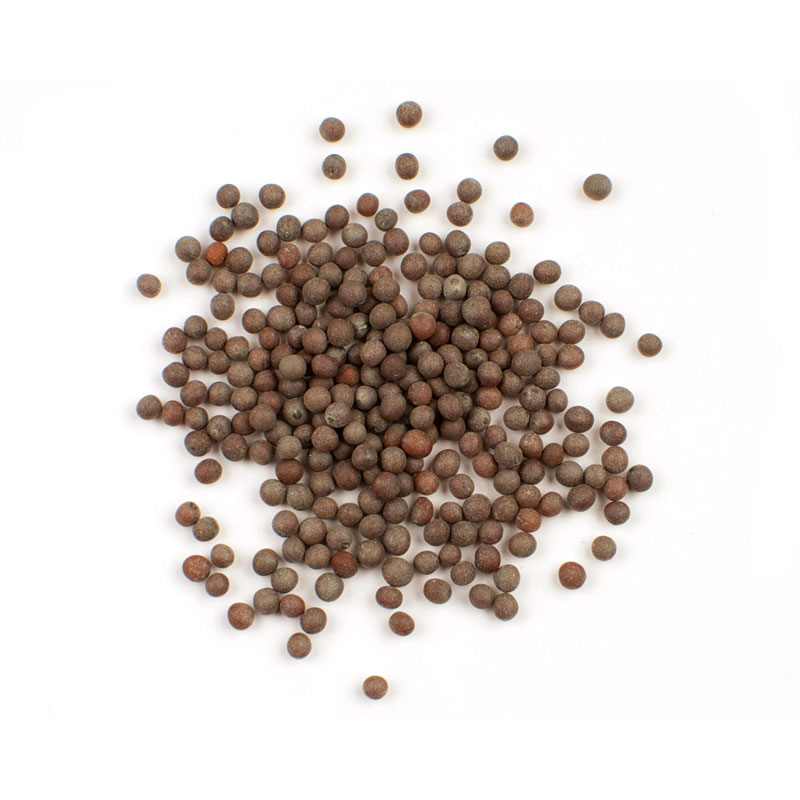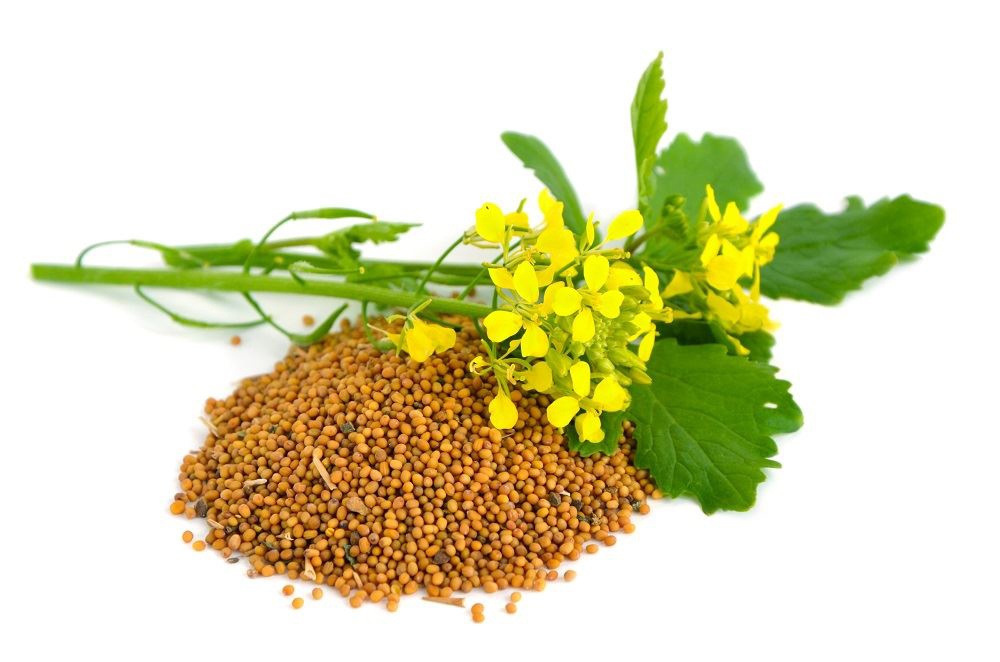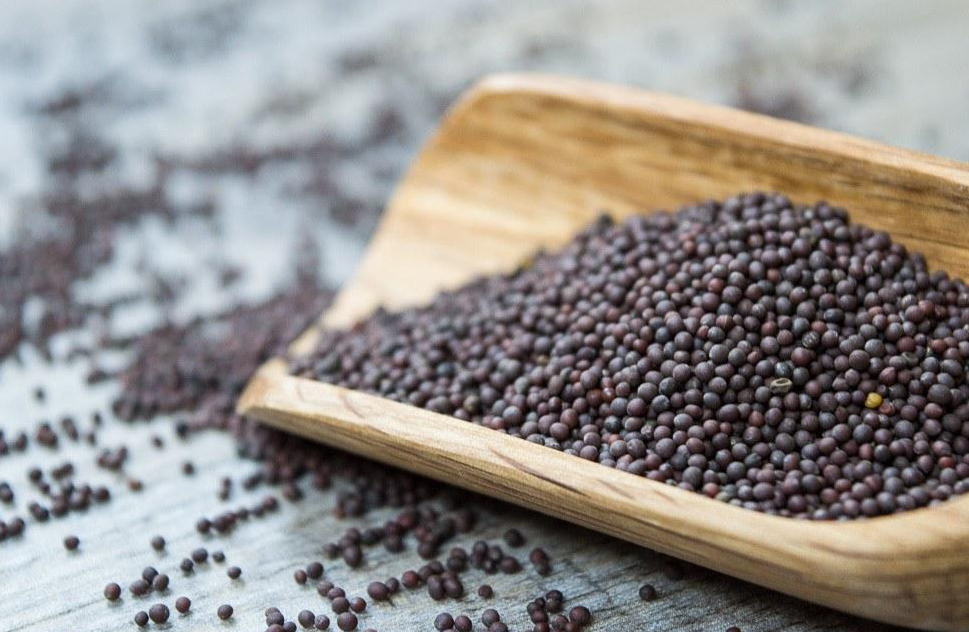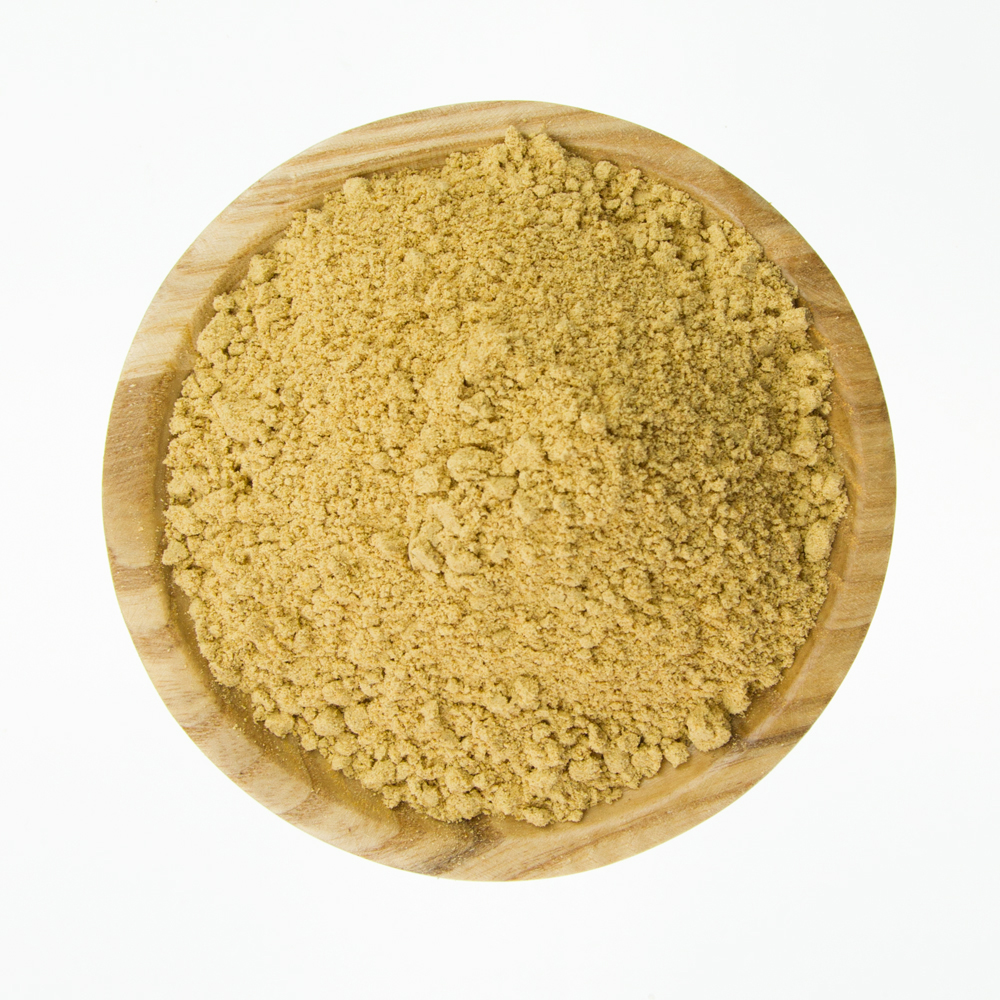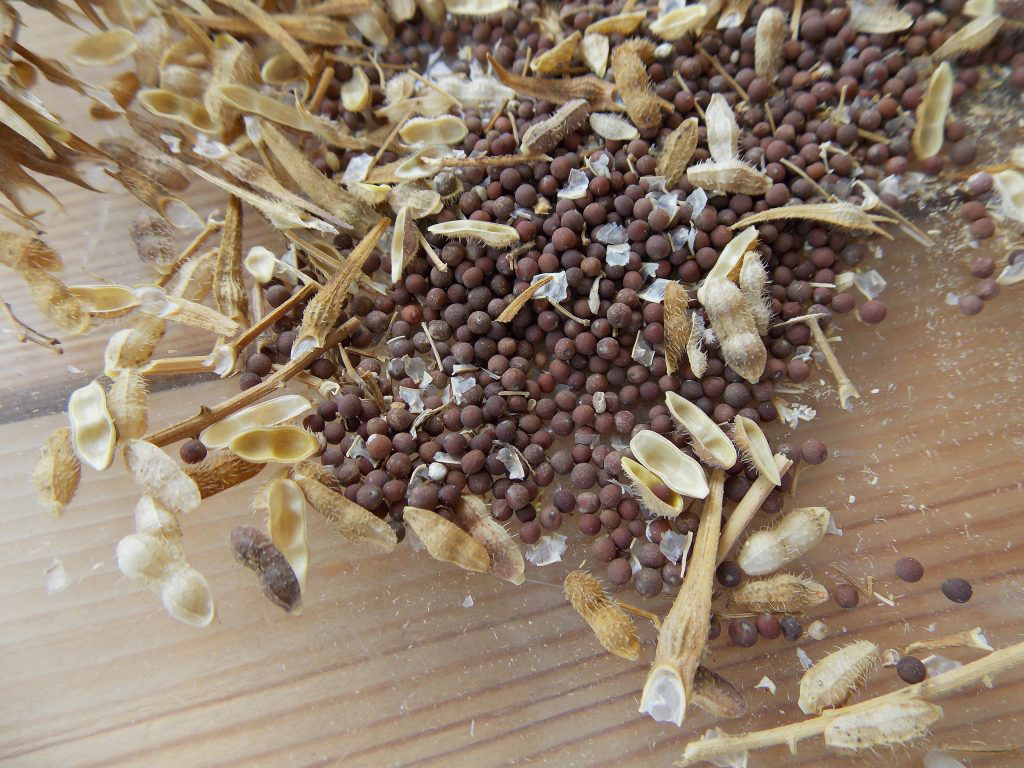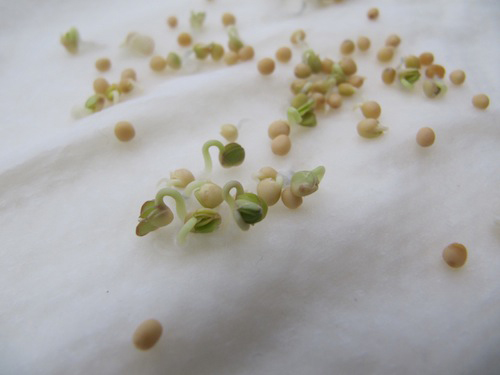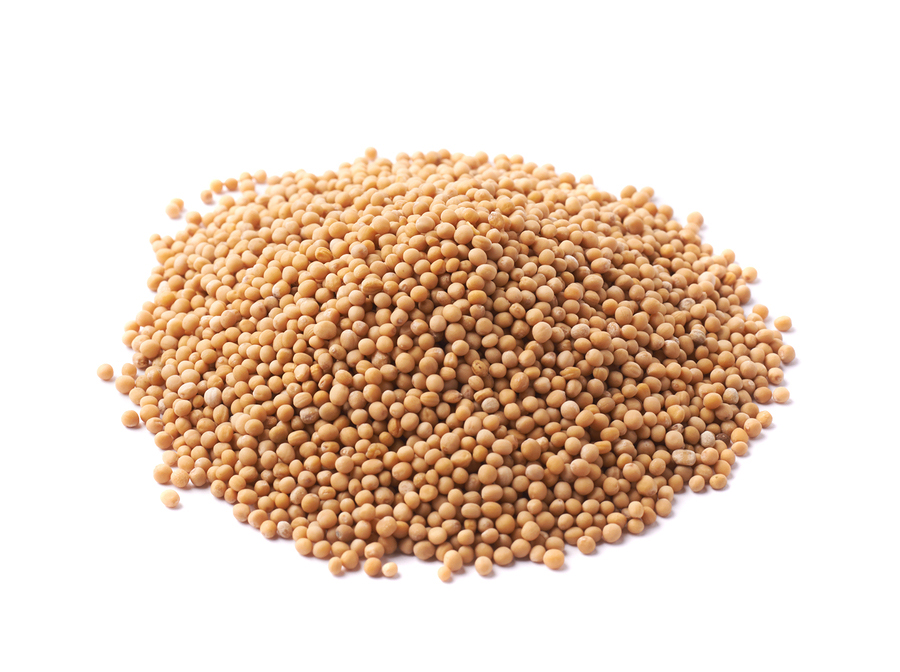| Mustard seeds Quick Facts |
| Name: |
Mustard seeds |
| Scientific Name: |
Brassica nigra |
| Origin |
It is originated in the Middle East. |
| Shapes |
Silique, long slender beaked pod, 1 to 2 cm long, smooth cylindrical, 1.5 to 2 mm wide |
| Calories |
32 Kcal./cup |
| Major nutrients |
Selenium (23.82%)
Phosphorus (7.43%)
Iron (7.25%)
Manganese (6.70%)
Total Fat (6.51%)
|
| Health benefits |
Prevention of cancer, Treat psoriasis, Helpful for contact dermatitis, Prevent cardiovascular problems, Relieve respiratory ailments |
The plant measures 2 meters high with many branches. Lower leaves are pinnatifid, dentate, lyrte and are often hairy on underside. Upper leaves on flowering stems are oblong and narrow. Flowers are cross shaped, four parted and yellow which occurs in racemes and produce four sided siliques which is a capsular fruit measuring 2.58 cm long. Each silique possesses two to twelve round seeds in reddish brown to black color. A plant produces thousands of seeds which is harvested by hand or mechanically before fully ripened. Mustard seeds are small and round seeds of mustard plants which measures about 1 to 2 millimeters in diameter and its color ranges from yellowish white to black. It is an important spice in many regional foods.
Mustard is effectively used in reducing stiff muscles, painful joints, stuffed up phlegm, tumors as well as pneumonia. Seeds are useful for dealing with the convulsions in children. Powdered mustard works well for reducing discomfort and pain brought on throughout menstruation as well as encourages blocked flow because of climatic causes. Mustard also supports to stimulate the metabolism helping drop additional fats. Mustard is helpful for muscular discomfort, psoriasis, ringworm, contact dermatitis and respiratory disorders. The various parts of mustard plant have been used since earlier times for cancer, diabetes and detoxification of the body. Mustard has got poison repelling features, exerts therapeutic effects on the nerves and enables maintain cardiac health. It stimulates healthy skin and hair, reduces cholesterol and is also an excellent botanical for ladies throughout menopause.
Mustard is really an adaptable cruciferous vegetable that belong to the Brassica family just like broccoli as well as cabbage. Native to the temperate areas of Europe, mustard was amongst the earliest grown crops in the region. From about thousands of years, mustard plants have been quite popularly grown in North Africa, Asia and Europe more like an herb was even well-liked among the historical Greeks and Romans. Mustard have been renowned like a multispecialty crop in North America since many years together with the major production happening in California and Montana till 1950 and about a decade later in the Upper Midwest regions. Presently mustard is grown in over 21 nations along with major production happening in EU-27, Nepal, Canada, Ukraine and India. Attributing to its flavor and therapeutic nature, use of mustard is very popular all over the world along with approx. 700 lbs getting consumed annually.
Mustard is really a multitalented botanical with numerous types. It comes from one of the three different plants: black mustard (Brassica nigra), white mustard (B. hirta/Sinapis alba) and brown Indian mustard (B. juncea). They are commercially grown and also utilized for their young flower stalks, leaves and seeds. White mustard or occasionally referred as yellow mustard features a milder taste and is also used within the preparation of the famous American yellow mustard condiment. Black mustard is popular because of its powerful aroma as well as flavor while, brown mustard which is also utilized to prepare Dijon mustard provides a sharp stinky taste.
Health Benefits of Mustard Seeds
Mustard plant possesses helpful constituents with various edible parts. The seeds are excellent source of minerals such as magnesium, calcium, potassium and phosphorus. It is a great source of dietary folate and Vitamin A. Mustard leaves or greens are a great source of essential minerals such as calcium, potassium and phosphorus. It is a great source of dietary fiber and magnesium. The adequate amount of vitamin content provided by mustard greens that includes ample amounts of Vitamin K, Vitamin A, Vitamin C and folate.
- Prevention of cancer
The seeds of Mustard plant possess ample amounts of nutrients that counteract cancers such as colon, bladder and intestinal cancer. Mustard circulates to form isothiocyanates with aid of enzymes found in mustard. The research found about anti-cancer formula of these substances which is found in seeds that deter cancer cells development and monitor towards forming any cancerous cells. It has ample aounts of healthy phytonutrients called glucosinolates that is effective against cancers. Studies have shown anti-cancer effects of these components that inhibits growth of cancer cells and guards against its formation. Seeds have chemopreventive properties that help to restore levels of glutathione and stimulate induction of apoptosis without affecting normal healthy cells.
- Treat psoriasis
Mustard seeds are effective for psoriasis and critical inflammatory autoimmune diseases. The conclusion proved its usefulness for treatment of inflammation and wounds associated with psoriasis. On the basis of research the medication with seeds promotes movement of healthy enzymes such as glutathione peroxidase, super-oxide dismutase and catalase which promotes defensive and treatment action in any illness.
- Helpful for contact dermatitis
Mustard seeds are helpful for therapeutic healing in contact dermatitis. The studies concludes that utilization of its seeds supports in treating the effects associated to contact dermatitides such as treating tissues and subdual swelling in ear.
- Prevent cardiovascular problems
Mustard oil is healthy when it comes to use cooking oil. The research have shown the outcome on patients with heart attack with greater results with outcome of lowering the chances of cardiac arrest, lowering in ventricular enlargement and chest pain associated to the diseases.
- Relieve respiratory ailments
Mustard seeds have soothing effects in treatment for cold and flu problems. It acts as decongestant that supports in emptying mucus through air passages. Its seeds are considered as warm meal and are valued for its treatment in calming fatigues caused from illness. The mustard seeds are consumed for healing sinus affected problems such as mixing of grind mustard seeds for treatment in emptying the jammed existed in respiratory organs and using it as a mouthwash with drink made of mustard seeds help to soothe sore throat. This plant has warming properties which absorb largely inside tissues and emptying excess mucus storage. These warming properties are associated with hot sensations that might trigger when exposed to tissues that are not concealed in mucus.
- Treat pains and aches
The plaster made from mustard seeds supports in treating pains. Mustard contains blooming properties and when applied as plaster, it provides pain relief effects in paralysis of limbs, other muscle problems and rheumatism. Moreover, mustard plaster provides hot sensations and produce painful blistering if spread on naked skin. In order to prevent this, one shout use some thin wrapper between skin and plaster.
- Repels poison
Mustard seeds contain preventative properties that help to repel symptoms of toxic on human body. The seeds concoction aids in emptying body mainly in toxin produced by drugs abuse and excess consumption of alcohol.
- Eliminates ringworm
Mustard seeds have anti-bacterial properties that are helpful for treating laceration which is produced by ringworm. The treatment of paste on skin made of mustard seeds on hygienic skin cleaned with hot water supports healing the effects associated with ringworms.
- Provides healing effect
Mustard plant possesses warm qualities that assist patients languishing from broken nerve. It triggers treatment process by activating nerve and has refreshing outcome towards nerves.
- Treat diabetes
Research has shown those medications of mustard oil supports to lower level of proteins and other glucose. It assists to lower peroxide activity and triggers healthy metabolism. Leaves of mustard are helpful for diabetic patients. Research shows antioxidant properties of mustard plant which supports to normalize the symptoms of oxygen free molecules and protects from the effects caused due to oxidative pressure in diabetes.
- Menopause treatment
Mustard seeds are beneficial for women during menopausal period. Magnesium with calcium helps to promote bone health and prevent bone damage associated with menopause. It supports to lower magnesium percentage in bones and insufficiency of magnesium and also aids in lowering the risk of osteoporosis in old women.
https://www.youtube.com/watch?v=WkLqAqWZdlU&t=144s
Skin Benefits Of Mustard Seeds
- Natural scrub
Mustard seeds really are a natural scrub. You can include it either to lavender or even rose essential oil. Make use of this mix to scrub the face as well as scrub dead skin.
- Hydrates skin
Mustard seeds, combined with aloe vera gel, can behave as an excellent mixture to hydrate the skin. It eliminates all impurities through the face as well as feeds it from inside.
- Slows ageing
Mustard seeds result in a great resource of carotene as well as lutein. Additionally it is an excellent power houses of vitamin A, C and K. Together these types of nutrients allow for a great antioxidant.
- Fights infections
These seeds include a fair amount of sulphur that is recognized for its anti-fungal qualities. They assist defend against skin ailment.
Hair Benefits Of Mustard Seeds
- Hair growth
Mustard oil, obtained from mustard seeds, is a great source of Vitamin A. Vitamin A is a superb nutrient for hair growth. Additionally it is an excellent stimulant which results in faster hair growth.
- Strengthens hair
Mustard seeds include protein, calcium, vitamin A and E, omega-3 and omega-6 fatty acids. Many of these together reinforce the hair from within. Strengthened hair signifies lesser hair fall too.
- Conditions
Mustard seeds include fatty acids. They are recognized to condition the hair from deep within. Additionally, it provides hair an excellent shine as well as bounce.
History of Mustard Seeds
The first mention of mustard seeds within the history of India is within a story of Gautama Buddha, where he is seen informing a crying mother to collect a number of mustard seeds from the house that has never seen the death of the family member. The mother knows that she is not alone who may have experienced the death of her son, there are numerous like her who have went through same pain. Mustard seeds were thoroughly utilized in French cuisine which may be traced back to 800 AD, while the seeds have been a well-known spice in Spain since the 15th century. According to historical records, it was Rome that first invented the concept of making a paste from mustard seeds and using it as a condiment in cooking. Mustard seeds were also a popular spice in ancient Greece. The mustard seed has frequently discovered a place within the scriptures of numerous religions. The Quran states that Allah punishes all forms of injustice, even when it is the size of one mustard seed. The Jewish texts compare the size of the universe to the size of a mustard seed to indicate how insignificant worldly pleasures are. In the New Testament of the Bible, Jesus claims that the kingdom of God initially started as the size of a mustard seed and after that gradually grew in size. Today mustard seeds are among the most generally exchanged spices, together with the major produce originating from Hungary, Great Britain, India, Canada and also the United States.
Types of Mustard Seeds
- Yellow Mustard Seed, Regular
Yellow mustard seeds, Brassica alba, are generally utilized in European as well as American cooking. This is actually the type required in many pickling as well as canning recipes, or perhaps in making corned beef or even boiled vegetables. You may also grind it fresh to use in making your personal mustard.
- Brown mustard seeds
Brown mustard seeds, Brassica juncea, are from a plant generally grown in India, China and Africa. These types of pungent seeds are favored over yellow in lots of Indian and African dishes for heat. In Germany and Russia, brown mustard seeds are frequently utilized in mustard condiments, particularly in their crushed form. Brown mustard seeds really are a common cultivar worldwide and quite often substituted with the harder-to-find black mustard seeds.
- Black mustard seeds
Black mustard seeds usually are small little powerful flavored seeds utilized most often in Indian cooking. Those are the most pungent of all mustard seeds. The tiny seeds are dark brown having a somewhat reddish color to some seeds.
Black Mustard Seeds really are a well-known spice utilized in dal curries, vegetarian dishes and much more. Mustard seeds are utilized for pickling also are available in brown or yellow seeds in addition to mustard powder.
Medicinal Uses of Mustard Seeds
- Digestive benefits of mustard could be extracted by having a cup of yogurt combined with powdered black mustard seeds. Additionally, drink a glass of buttermilk after the yogurt to stop piles.
- Mustard benefits in reducing arthritis pain by making use of a mix of black or white mustard seed oil as well as rubbing alcohol onto the skin. You may also utilize a combination of warm mustard oil as well as 2-3 pieces of camphor.
- Another natural remedy involves soaking in bath water combined with one teaspoon each of mustard and cayenne. Brown mustard oil is wonderful for asthma.
- Soaking in bath water combined with mustard seeds (tied in the cloth bag) might help decrease high blood pressure as well as fatigue.
- When confronted with asthma, bronchitis, pneumonia, etc., use a mustard flour poultice around the chest for around 15 minutes.
- For rheumatism, ground the seeds and made it into paste and apply it to skin.
- Apply the mustard externally to provide relief from congestion.
- For colds and headaches, pour the hot water on bruised seeds which makes a stimulant foot bath.
- Mustards are also used for treating epilepsy, alopecia, toothache and snakebite.
- The seed decoction is used for treating indurations of spleen and liver.
- The seed is consumed as a tonic and appetite stimulant.
- Mustard tea is useful for treating hiccup.
- Drink a glass of milk by adding few black mustard seeds to increase appetite. Consume it before 15 to 20 minutes of meals.
- Grind quarter teaspoon of mustard seeds with water to form a paste. Consume this paste by adding honey for clearing chest congestion.
- Sip a cup of warm water combined with two teaspoons of mustard powder.
- Mix two cups of honey and four cups of water by adding tablespoon of white mustard powder in it. Consume one tablespoon of this mixture regularly to provide relief from constipation.
- Apply the paste made with mustard seeds on skin to heal ringworm. Use this paste three to four times a day and wash it with lukewarm water.
- Roast handful of mustard seeds in a liter of coconut oil. After the mixture cools, strain it and apply it to lighten the skin color and to eliminate pimples.
- Ancient Greeks used the mustard paste in treating toothache, lack of appetite and poor blood circulation.
- The seed decoction is used for induration of liver and spleen and also for treating tumors, carcinoma and abscesses.
Prepare this particular poultice by combining 100g black mustard powder along with water, adequate enough to make a soft paste. People who can’t tolerate strong mustard may use a half the quantity of mustard as well as 100g of flax flour.
Precautions
- The people who are allergic to mustard should avoid it.
- Excessive use of mustard causes gastric irritation, bleeding from intestinal mucosa and stomach.
- People with health problems should consult doctor for use.
- Avoid its excessive use.
How to Eat
- It is used as a spice in Northern India, Pakistan, Bangladesh and Nepal.
- Brown mustard seeds are used to garnish after sautéed in a oil for little.
- In Bangladesh and West Bengal, Mustard fish curry is made with coriander powder, mustard paste, nigella and chilies.
- Use the mustard paste in sandwiches, salad dressings, mayonnaise and hot dogs.
- Mustard seeds could be roasted in a skillet.
- It is also added to various food products such as mayonnaise sauces, salad creams, piccalilli, pickles and curries.
- In Indian cuisine, black mustard seed is used as a spice in curries.
- Black mustard seeds are vital component for Bengali five spice mixture panch phoron.
- In North American and European cuisine, black mustard seeds are ground and combined with water or vinegar for making prepared mustard.
- It is used as a vital ingredient in salad dressings, sauces and is popular for consuming it with sausages.
- The powder of mustard seeds are used to flavor foods.
References:
https://www.itis.gov/servlet/SingleRpt/SingleRpt?search_topic=TSN&search_value=23061#null
https://davesgarden.com/guides/pf/go/31972/
https://www.pfaf.org/user/Plant.aspx?LatinName=Brassica+nigra
https://en.wikipedia.org/wiki/Mustard_seed
https://www.nutrition-and-you.com/mustard-seeds.html
http://www.softschools.com/facts/plants/mustard_facts/1207/
https://drhealthbenefits.com/herbal/herbal-plant/health-benefits-chewing-mustard-seed
https://www.organicfacts.net/health-benefits/herbs-and-spices/mustard.html
Comments
comments


